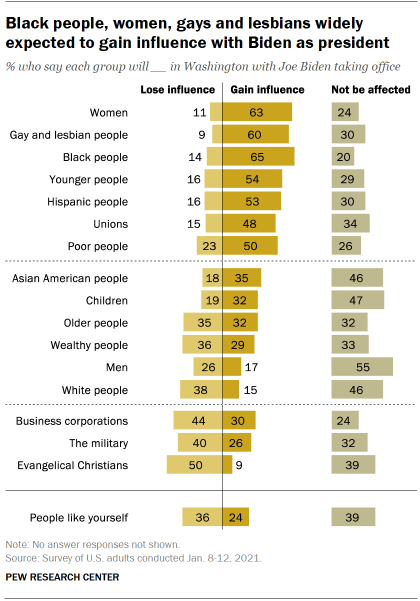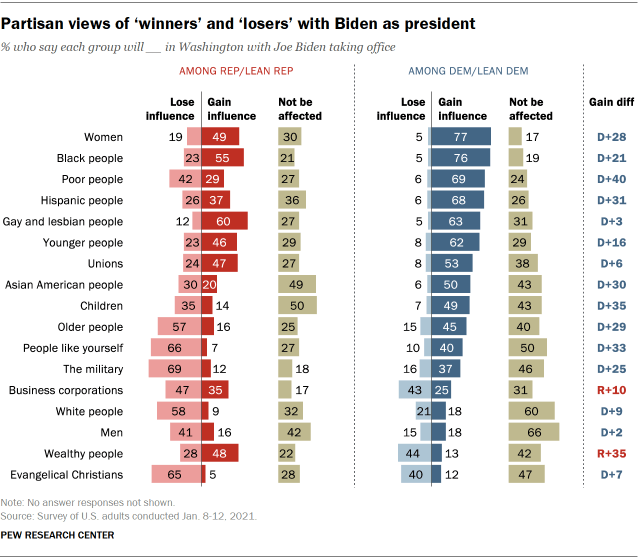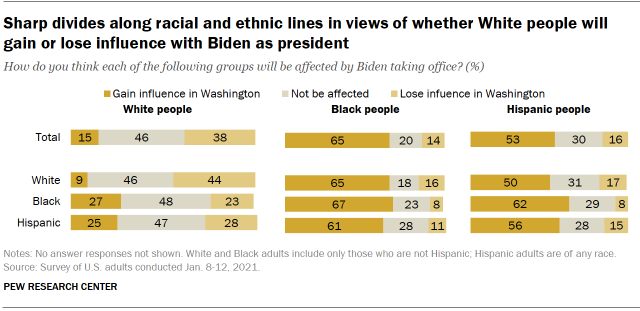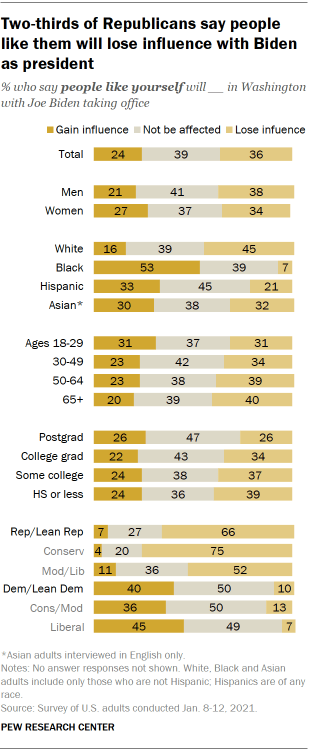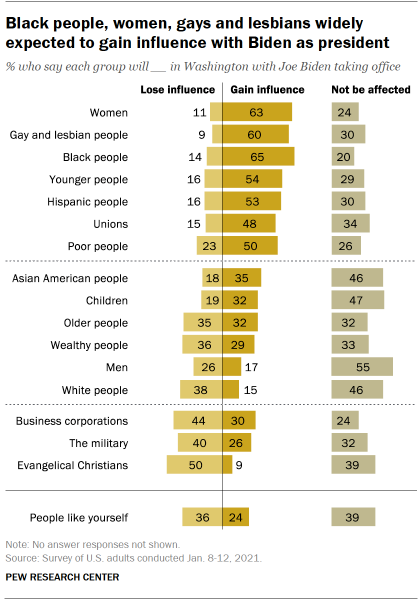
Pew Research Center conducted this study to understand which groups the public views as likely to gain or lose influence with Joe Biden taking office. For this analysis, we surveyed 5,360 U.S. adults in January 2021. Everyone who took part in this survey is a member of the Center’s American Trends Panel (ATP), an online survey panel that is recruited through national, random sampling of residential addresses. This way nearly all U.S. adults have a chance of selection. The survey is weighted to be representative of the U.S. adult population by gender, race, ethnicity, partisan affiliation, education and other categories. Read more about the ATP’s methodology.
Here are the questions used for the report, along with responses, and its methodology.
As Joe Biden navigates the first few weeks of his presidency, Americans have distinctly different views of which groups will gain influence – and which ones will lose influence – in Washington during his administration.
Nearly two-thirds of U.S. adults (65%) say Black people will gain influence in Washington with Joe Biden taking office. Just 14% say Black people will lose influence, while 20% say they will not be affected.
Large shares of adults also expect women (63%) and gay and lesbian people (60%) to gain influence over the next four years. Only about one-in-ten expect each of these groups to lose influence.
Other groups expected to gain influence include younger people (54%), Hispanic people (53%), poor people (50%) and unions (48%). Relatively small shares – no more than about quarter – say any of these groups will lose influence during Biden’s presidency.
By contrast, evangelical Christians are expected to lose influence with Biden as president: 50% say they will lose influence, while just 9% expect them to gain influence; 39% say they will be unaffected.
By sizable margins, more Americans also say business corporations and the military will lose than gain influence, though about a quarter (24%) say corporations will be unaffected and 32% say the same about the military.
While larger shares expect Black, Hispanic and Asian American people to gain rather than lose influence, more than twice as many Americans say White people will lose (38%) influence in Washington as say they will gain it (15%); nearly half (46%) say that White people will be unaffected.
The Pew Research Center survey, conducted on the Center’s nationally representative American Trends Panel from Jan. 8-12, 2021, among 5,360 adults, finds a contrast between the public’s views of the groups that will gain or lose influence today with opinions four years ago, at the start of Donald Trump’s presidency. Many of the groups of people who are now expected to gain influence under Biden, including women, Black people, Hispanics and gays and lesbians, were expected to lose clout with Trump as president.
As was the case on the eve of Trump’s presidency, more Americans say “people like yourself” will lose (36%) than gain (24%) influence in Biden’s presidency; 39% say they will not be affected.
The public’s views of how various groups will be impacted by Biden’s presidency are more similar to expectations for Barack Obama’s administration shortly before he became president in 2009. At that time, majorities thought younger people, poor people and Black people would gain influence.
Wide partisan gaps over whether the poor – and wealthy – will gain or lose influence with Biden as president
Republicans and Democrats differ significantly about which groups stand to gain or lose influence in Washington during Biden’s presidency. With the Democratic Party in control of Congress and the presidency, large majorities of Democrats and Democratic-leaning independents say that a number of groups will gain influence over the next four years. For example, at least six-in-ten Democrats say women (77%), Black people (76%), poor people (69%), Hispanic people (68%), gay and lesbian people (63%), and younger people (62%) will gain influence under Biden.
Republicans and Republican leaners are more divided in expectations for most of these groups, with gay and lesbian people a notable exception. Comparable shares of Democrats (63%) and Republicans (60%) say gays and lesbians will gain influence, though 12% of Republicans say they will lose influence versus just 5% of Democrats.
Republicans are less likely than Democrats to say women and Black people will gain influence, though on balance, more Republicans say both groups will gain influence than say they will lose it.
There are more striking differences in views of how poor people will be affected. Roughly seven-in-ten Democrats (69%) say poor people will gain influence under Biden, while just 29% of Republicans say the same. In fact, 42% of Republicans say poor people will lose influence, with 27% expecting the poor to be unaffected.
And Republicans (48%) are far more likely than Democrats (13%) to say wealthy people will gain influence with Biden as president. Larger shares of Democrats than Republicans say wealthy people will either lose influence or not be affected by a Biden presidency.
In 2017, White people and men were two of the groups that were widely expected to gain influence with Trump as president. Today, Republicans and Democrats have very different expectations for these groups. A majority of Republicans (58%) expect White people to lose influence over the next four years. In contrast, a similar share of Democrats (60%) expect that White people’s influence will not be affected.
There is a similar pattern in views of men. While a majority of Democrats say men’s influence in Washington will not be affected by a Biden presidency (66%), Republicans are more divided: 41% expect men to lose influence, while 42% say their influence will not be affected.
Differences by race and ethnicity in views of how White people will be affected by Biden’s election
While majorities of adults say they think Black and Hispanic people will gain influence in Washington now that Biden is president (65% and 53%, respectively), the public is more divided on how White people will be affected.
On balance, more than twice as many adults say White people will lose influence (38%) rather than gain influence (15%) in the Biden administration, with a plurality saying their influence will not be affected. But there are sharp divides in these views by race: 44% of White adults say they think White people will lose influence in Washington, while far smaller shares of Black and Hispanic adults say the same (23% and 28%, respectively).
Similarly, while just 9% of White adults say White people will gain influence in the Biden administration, about a quarter of Black (27%) and Hispanic (25%) adults expect White people’s influence to grow.
Overall, about two-thirds of adults say that Black people will gain influence in the Biden administration; this includes about two-thirds of Black (67%) and White (65%) adults, as well as 61% of Hispanic adults. A majority of adults (53%) also expect Hispanic people to gain influence, including 56% of Hispanic adults, 62% of Black adults and 50% of White adults.
Wide partisan differences over whether ‘people like yourself’ will gain or lose influence
Overall, large shares across many groups of Americans say the influence of “people like yourself” will not be affected with Biden taking office, but there are some notable differences by race, partisanship and ideology.
Among the public overall, 39% of adults say the influence of people like them will not be affected, while a slightly smaller share (36%) say they will lose influence in Washington. About a quarter (24%) say people like them will gain influence.
Nearly half of White adults (45%) say people like them will lose influence in Washington, while only 16% say they will gain influence and 39% say they will not be affected.
Black adults, by contrast, are far more likely to say people like them will gain (53%) than lose (7%) influence. Fewer Hispanic (33%) and Asian American adults (30%) expect that people like them will gain influence.
The widest gaps in perceptions of how people like them will be affected by the new president are by partisanship. Republicans and Republican leaners generally feel like they will lose influence in Washington with Biden as president: 66% say people like them will lose influence, while 27% expect to not be affected and just 7% say they will gain influence.
Among Republicans, conservatives are more likely than moderates and liberals to say people like them will lose influence (75% vs. 52%, respectively).
Democrats are far less likely than Republicans to say that people like them will lose influence, but most do not expect to gain influence. Half of Democrats and Democratic leaners say people like them will not be affected with Biden as president, while 40% say they will gain influence; just 10% expect to lose influence. Liberal Democrats are more likely than conservative and moderate Democrats to say people like them will gain influence in Washington (45% vs. 36%, respectively).
